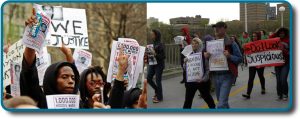Pre-Reading
Pre-Reading Activity
Read the quote below from “Reading 1” and discuss the following questions.
“Social factors can determine whether human behavior tends toward conflict or harmony.”
-
- What does the quote above mean?
- What causes conflict between people?
- Why are people sometimes able to cooperate in difficult situations and sometimes not?
The following words will be defined in the reading. Do you know any of these words?
- interpersonal
- intrapersonal
- social cognition
- social psychology
Reading 1: What Is Social Psychology? [1]
Humans are diverse, and sometimes our differences make it challenging for us to get along with one another. A poignant example is that of Trayvon Martin, a 17-year-old African American who was shot by a neighborhood watch volunteer, George Zimmerman, in a predominantly White neighborhood in 2012. Zimmerman grew suspicious of the boy dressed in a hoodie and pursued Martin. A physical altercation ended with Zimmerman fatally shooting Martin. Zimmerman claimed that he acted in self-defense; Martin was unarmed. A Florida jury found Zimmerman not guilty of second-degree murder nor of manslaughter.

Several groups protested what they deemed racial profiling and brutality against an unarmed Black male. Zimmerman, who has a Peruvian mother and a German father, was accused of being racist. Some media coverage was criticized for inflaming racial politics in their coverage. In spite of conflicts such as these, people also to work together to create positive change. For example, after the 9/11 terrorist attacks, people rallied together and charitable donations skyrocketed (Brown & Minty, 2006). This chapter explores how the presence of other people influences the behavior of individuals, pairs, and groups. Social factors can determine whether human behavior tends toward conflict or harmony.
Social psychology examines how people affect one another, and it looks at the power of the situation. Social psychologists assert that an individual’s thoughts, feelings, and behaviors are very much influenced by social situations. Essentially, people will change their behavior to align with the social situation at hand. If we are in a new situation or are unsure how to behave, we will take our cues from other individuals.
The field of social psychology studies topics at both the intra- and interpersonal levels. Intrapersonal topics (those that pertain to the individual) include emotions and attitudes, the self, and social cognition (the ways in which we think about ourselves and others). Interpersonal topics (those that pertain to pairs and groups) include helping behavior (Figure 2), aggression, prejudice and discrimination, attraction and close relationships, and group processes and intergroup relationships.

Social psychologists focus on how people construe, or interpret, situations and how these interpretations influence their thoughts, feelings, and behaviors (Ross & Nisbett, 1991). Thus, social psychology studies individuals in a social context and how situational variables interact to influence behavior.
Reading Comprehension
Choose the best answer to the following question.
- As a field, social psychology focuses on ________ in predicting human behavior.
- personality traits
- genetic predispositions
- biological forces
- situational factors
- ________ processes relate to the individual, including emotions, attitudes, the self, and social cognition.
- Interpersonal
- Intrapersonal
Answer the questions in your own words.
- Why did the authors choose to include Figure 2?
- Look up the definitions of psychology and sociology. How is social psychology different from sociology?
- Given what you encountered in “Reading 1,” what concepts do you think will be explored in the rest of the chapter?
Vocabulary Practice
Discuss the questions below using vocabulary from the reading.
- The Trayvon Martin case is said to illustrate racial bias. What other kind of biases do people have?
- What other examples of bias might pertain to the reading?
- What are other examples of physical altercations?
- In what ways do people rally together after a disaster?
- Why do we take our cues from others when we are in a new situation or are unsure of how to behave?
Complete the sentences with the best word. You may need to change the verb form to fit the sentence.
|
range poignant predominantly pursue variables |
- There are many _________________________ that affect people’s behavior in a given situation.
- Many students in the U.S. _________________________ degrees in psychology. It’s one of the most popular majors.
- People at the protest were _________________________ from the United States.
- The movie shows several _________________________ examples of racism.
- Factors that may affect the way people view themselves _________________________ from social elements to physical traits.
Reading Discussion
Discuss these questions with your classmates.
- Provide a personal example of an experience in which your behavior was influenced by the people around you, for example at a sports event, at school, etc. Was their effect positive or negative?
- The reading mentions that power dynamics can affect behavior. When you speak to someone with greater power or authority, how does their position affect your behavior and speech?
- Download the original, un-adapted version for free at https://openstax.org/details/books/psychology ↵
